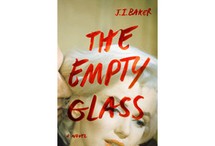Page-Turners You'll Tear Through
Warning, Judges: These new books will keep you up all night to finish.

36 of 46
The Empty Glass
By J.I. Baker
336 pages;
Blue Rider Press
Marilyn Monroe is dead...by suicide. So why does all
the evidence suggest that she was murdered? Los Angeles County deputy coroner
Ben Fitzgerald’s relentless search for answers leads him down a dangerous path
away from his sanity—and takes readers along with him. The story is
filtered through his clipped, Bogartesque narration, as well through entries of
Marilyn’s diary—a totally credible imagining of her uncensored
speech: breathy, sparingly punctuated and a little bit lost. The two voices
interweave throughout the book. One
minute Marilyn speaks, the next Ben narrates his movements in the days
following her death, and then he argues with a doctor, who, it becomes
increasingly clear, is questioning him . As Ben’s mind unravels, the threads of the story
pull together ever more tightly. The characters may be, as Marilyn recounts,
“slipping, which is what I feel a slow slipping,” but Baker is totally in
control, and watching him lead his hero along a precarious tightrope of reason
is scary—and totally exhilarating.
— Nathalie Gorman
Published 07/02/2012


